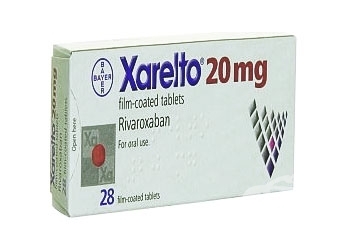- Home
- Editorial
- News
- Practice Guidelines
- Anesthesiology Guidelines
- Cancer Guidelines
- Cardiac Sciences Guidelines
- Critical Care Guidelines
- Dentistry Guidelines
- Dermatology Guidelines
- Diabetes and Endo Guidelines
- Diagnostics Guidelines
- ENT Guidelines
- Featured Practice Guidelines
- Gastroenterology Guidelines
- Geriatrics Guidelines
- Medicine Guidelines
- Nephrology Guidelines
- Neurosciences Guidelines
- Obs and Gynae Guidelines
- Ophthalmology Guidelines
- Orthopaedics Guidelines
- Paediatrics Guidelines
- Psychiatry Guidelines
- Pulmonology Guidelines
- Radiology Guidelines
- Surgery Guidelines
- Urology Guidelines
ACC Update: Rivaroxaban Reduces Venous Thromboembolism Recurrence Compared with Aspirin

WASHINGTON: In patients at elevated risk for a recurrence of potentially life-threatening blood clots, a low dose of the oral blood-thinning medication rivaroxaban reduced recurrences more than three-fold compared with aspirin, with no significant increase in bleeding side effects, according to research presented at the American College of Cardiology's 66th Annual Scientific Session.
"We have shown that practitioners can safely prescribe rivaroxaban for patients at risk for a recurrent venous thromboembolism (VTE) without being concerned that doing so will increase risk for bleeding side effects," said Philip S. Wells, MD, chief of the department of medicine at the University of Ottawa and Ottawa Hospital in Canada and a co-investigator on the study.
A VTE may occur as a blood clot in a deep vein, usually in a leg (deep vein thrombosis) or as a clot that travels from elsewhere in the body to the lungs (pulmonary embolism). Patients who have had a VTE generally are treated with a blood-thinning medication, or anticoagulant, for six to 12 months after the event. However, some patients remain at elevated risk for another blood clot, as well as for a heart attack or stroke, if anticoagulant therapy is stopped, Wells said. The most common risk factors for VTE are cancer and immobility due to surgery or illness, he said. In addition, some patients develop what are known as "unprovoked" VTEs – that is, VTEs that occur in the absence of known risk factors.
Previous studies have suggested that extended treatment with an anticoagulant such as warfarin or rivaroxaban reduced risk for a recurrent VTE, while other studies have shown that aspirin also reduced risk for a recurrent VTE and might present a lower risk for bleeding side effects than extended treatment with an anticoagulant. This study was the first to directly compare the safety and effectiveness of rivaroxaban and aspirin in patients at risk for a recurrent VTE, Wells said.
The international multicenter study enrolled 3,396 patients who had completed six to 12 months of anticoagulant therapy for a VTE. Patients' average age was 59, and 55 percent were men. Patients were 77 percent Caucasian, 14 percent Asian and 4 percent African-American. Patients were randomly assigned to receive 10 mg of rivaroxaban, 20 mg of rivaroxaban or 100 mg of aspirin once daily for up to 12 months.
The study's primary efficacy endpoint was recurrence of VTE. Secondary efficacy endpoints were deaths due to VTE and unexplained deaths for which VTE could not be excluded as a cause. The primary safety endpoint was major bleeding. The secondary safety endpoint was non-major bleeding that caused an interruption in treatment, a minor medical intervention, physician visit or disruption to daily quality of life.
After a median follow-up of 351 days, 1.2 percent of patients receiving 10 mg of rivaroxaban and 1.5 percent of those receiving 20 mg of rivaroxaban had had a recurrence of VTE, compared with 4.4 percent of patients receiving aspirin. The difference was statistically significant for both rivaroxaban groups compared with aspirin. There were no statistically significant differences on the secondary efficacy endpoints.
Major bleeding occurred in 0.3 percent of patients receiving aspirin, 0.4 percent of those receiving 10 mg of rivaroxaban, and 0.5 percent of those receiving 20 mg of rivaroxaban – differences that were not statistically significant. There were no statistically significant differences on the secondary safety endpoint.
"Rivaroxaban had significantly greater efficacy in preventing VTE recurrence without significantly increasing risk for major bleeding," Wells said. "Our findings show that it's [a safe option] and appears to be highly protective against potentially life-threatening recurrent VTE."
A limitation of the study is that the results may not be generalizable to other patients at risk for recurrent VTE, Wells said. For example, study participants were younger than the typical patient with a VTE. The investigators plan to conduct a follow-up study to examine whether low-dose rivaroxaban is equally effective in other patient populations, he said.
The study was funded by the German pharmaceutical company Bayer AG.
The study was simultaneously published online in the New England Journal of Medicine at the time of presentation.

Disclaimer: This site is primarily intended for healthcare professionals. Any content/information on this website does not replace the advice of medical and/or health professionals and should not be construed as medical/diagnostic advice/endorsement or prescription. Use of this site is subject to our terms of use, privacy policy, advertisement policy. © 2020 Minerva Medical Treatment Pvt Ltd